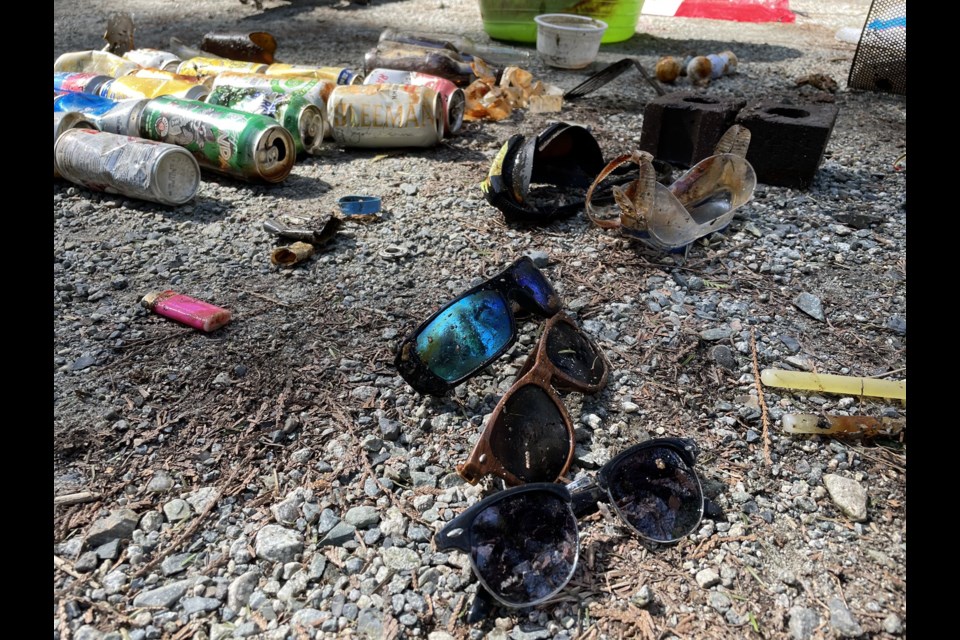With an upcoming initiative, the Sea to Sky version of the saying "one man's trash is another man's treasure," is set to become "one person's marine trash is another person's art."
The and several other arts councils in our region are pairing up with for a comprehensive art and education project.
As most locals well know, the volunteer-group Divers for Cleaner Lakes and Oceans has been hauling out trash from the bottom of lakes, such as Cat and Brohm Lakes for years.
The multi-month, multi-agency project, , will include artists in each community working with trash supplied from the group’s dives.
Amy Liebenberg, executive director of the Squamish Arts Council, is a volunteer with the organization and has known its founder Henry Wang for years.
Wang approached her with the idea of using some of the trash hauled out of lakes for art and the council jumped in with both feet, she said.
Working together
Pre-COVID, the , made up of councils from Whistler, Pemberton, Lions Bay, Bowen Island and Squamish had been looking at doing a touring show with an environmental theme.
This project fits the bill.
The arts councils from North and West Vancouver were soon added to the list of participants.
Artists in each of the participating communities will be asked to work with school groups in the creation of their art.
The art will ultimately be toured through each community.
"One thing that art can do that nothing else can is evoke emotion, it can highlight an idea, it can bring about conversation in a roundabout way that doesn't seem confrontational," Liebenberg said. "It engages you. It draws you in and it allows you to think about it on your own terms and is a much more effective way to highlight and address the issue."
Trash talk
Each artist will be given 100 pieces of some type of trash retrieved from a waterway to create their unique piece with.
"You might get golf balls or fishing lures — you don't know," Liebenberg said.
For the artists, the project allows their work to be shown in communities where they may not normally be showcased.
The art will be hitting the road next April.
Artists in each community are currently being selected.
Diving in
"Can you imagine making a chandelier out of all spoons or sunglasses or something," Wang said, reflecting on the original conversations around the project.
He said he has been collecting the artists’ items for the last few months. The “ingredients” in the packages may include sunglasses, golf balls, lighters, shotgun shells, fishing lures, fishing lead weights, fish floats and the like.
Pitch in
There will also be side-by-side underwater and shoreline clean-ups scheduled.
"It is kind of a cool way for the community to be involved," Wang said.
The public can pitch in with the land-based clean-ups.
A cleanup is scheduled for in Whistler, followed by another in West Vancouver on .
There will be more in other communities, including Squamish, to follow.
Local companies have jumped onboard as well.
It takes a village
"We've just had the most amazing community support for this project. Everybody is really behind it," Liebenberg said.
is going to be the touring sponsor and Squamish's newly launched is helping out with the beach cleans.
The company will be sorting trash from the shoreline cleanups.
"We are trying to divert as much plastic, specifically, from going into the landfill," said company owner Grace MacLeod.
sells compostable garbage bags and gloves that will be used for the shorelines cleanups. Reusable burlap sacks will also used to reduce waste even further.
Raising awareness
The enormity and damage of trash in our environment can't be hidden any longer, Liebenberg said.
"You can't throw your garbage in the water anymore and expect people not to find it or for it not to have an impact," Liebenberg said, noting however that divers are aware that not all the trash in local waters was put there intentionally. Regardless of how it gets there, though, damage is done.
"I have personally, as a diver, seen the destruction underwater and have seen the marine life — it dies. There's an epicentre of destruction around each piece of garbage."
On a more hopeful note, Liebenberg said that for some lakes, divers don't have to clean as frequently as they used to because people do seem to be getting the message.
Wang said he recently got a message from someone who had dropped a Bluetooth speaker into the water and reached out to Wang to apologize for the future work he had inadvertently caused for the divers at Cat Lake.
"People are aware," Wang said, with a chuckle, noting that he will look out for the speaker.
Find more information or to get involved, check out on the following sites:




